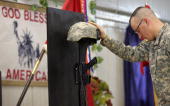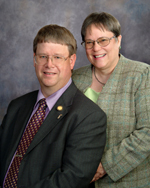Mar
31
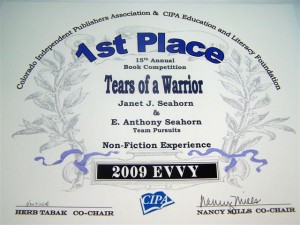
The 15th annual Colorado Independent Publishers Association (CIPA) EVVY Book Awards Banquet was held Saturday March 28th. Tears of a Warrior won two awards. Tears of a Warrior won 1st Place EVVY Award (overall book design, writing, editing and production) in the Non-Fiction/Experiences category. Authors Tony and Janet Seahorn had a previously scheduled engagement and were not able to attend the event but they were both very honored to receive the award. Karen Saunders, owner of MacGraphics Services accepted on their behalf. Graphic designer Kerrie Lian won a 2nd Place Tech award for her compelling book cover design. Kerrie also designed the interior of the book. Karen Reddick contributed with editing and Mary Walewski is working with the authors in marketing the book.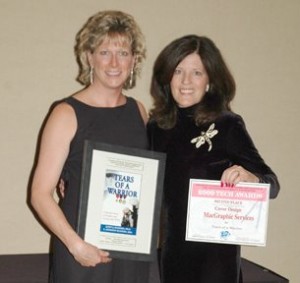 (buythebookmarketing.com)
(buythebookmarketing.com)
(Left) Karen Saunders, founder MacGraphics Services & Kerrie Lian, graphic designer
Mar
30
A Quiet Place to Wait
Filed Under American Patriotism | 1 Comment
 It was early Friday morning. We were waiting in the Phoenix airport to board our flight back to Colorado after spending a week in Sedona. We went there to hike, rest, and get back to nature. The recuperation was something we needed after spending so much time on finishing our book and the grueling task of trying to market it to the public.
It was early Friday morning. We were waiting in the Phoenix airport to board our flight back to Colorado after spending a week in Sedona. We went there to hike, rest, and get back to nature. The recuperation was something we needed after spending so much time on finishing our book and the grueling task of trying to market it to the public.
Writing a book is one thing, but promoting it is something even more challenging. Something we never fully comprehended. Marketing means you constantly have to be talking about a topic that you would rather put behind you. It is a necessary part of the book publishing process; yet, we truly wished there was a simpler way to get our book out there.
As we sat in the main terminal of Sky Harbor International Airport eating our light breakfast, we noticed a sign pointing to the second floor offices that read, Phoenix Military & Veterans Hospitality Room. Interesting. We wondered what a “hospitality room” for veterans looked like in an airport, so we decided to investigate. What a special place for military personnel and their families. The lounge had several computers for individuals to catch up on their e-mail. There were rooms full of books on various military topics, including PTSD. Children could play in a section close by filled with colorful beanbag chairs, games, puzzles, and activities that would help fill the time as families waited for connecting flights. A huge television set up with video games and DVDs offered entertainment of another source. A second large TV occupied a different area with several comfy reclining chairs and a small coach. On occasion, when an individual had to spend the night, a volunteer stayed with him or her for company. In addition to all the amenities, the Hospitality Center had an area filled with free snacks. Here one could munch on a variety of candies, popcorn, soups, soft drinks or a have a cup of hot coffee and tea. The entire area was set-up to make the time spent at the airport more comfortable for military personnel and their families.
All of the amenities were great, yet, the best part of the Center was the volunteers – fellow veterans who only wanted to do something to support other military personnel. They were proud of their unique center. Their only motivation was to make a small difference. They certainly are doing that and far more!
Mar
10
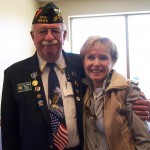 Celebration: New Veteran’s Center
Celebration: New Veteran’s Center
With today’s economic and world issues, it sometimes appears there is little to celebrate. Last Friday morning was an exception. It was the opening of the new VA Clinic in Fort Collins, CO. The Center is a place where our wounded warriors can go to heal, to obtain support for both emotional and physical problems, and a place to get information. Dozens of VA dignitaries, community members, veterans and their families, as well as delegates representing Mark Udall, Michael Bennett, and Betsy Markey attended the special ribbon-cutting celebration. Unquestionably what made the celebration special were the people; people who have given so much in service of our country. And people who are giving so much to heal them: doctors, nurses, therapists, office workers, and the list grows. There were a few individuals I spoke with who moved my heart. The first was Dan Griffin. I didn’t focus on his rank or even the conflict in which he served. These details just didn’t seem all that essential to me at the time. What drew me to Dan Griffin was his solitary stance of dignity. He wore a uniform and hat filled with medals and ribbons. He didn’t mingle much, just stood in a back corner of the room watching, listening. I walked over to him, drawn by his silence and stature. It was obvious he was a shy person – even told me this himself. I asked a few questions of him and he responded to with a minimum of words. Proudly he mentioned to me that next year he will be the Commander of Post 10 of the VFWs – the largest VFW post in the state of Colorado. Then he went on to talk about last summer’s group reunion in Gunnison. He described how much he liked to fish, especially the lakes with the “Big Ones”! Upon leaving, I gave him a hug. What I really wanted to say to Dan Griffin, but the words were caught in my throat, was how much I honored and appreciated his service, his life, his courage.
Then there was Meg Corwin whose quiet sacrifice few people will ever have to endure. She had been a military person for over twenty years, recently retired and now serving on Senator Michael Bennet’s staff. Her husband was shot and killed by a sniper two years ago during his second tour of duty in Iraq. Saying “Thank You” for your service and your husband’s sacrifice just seemed a bit passé. How can one truly thank a person who has given so much? I couldn’t. Ms. Corwin showed such strength and dignity during her speech to the group. I questioned if I could be so brave in similar circumstances – whether I could talk about my loss with such control? Truly, I don’t know the answers. What I do know is this; many families have made similar sacrifices. Many families, mothers, fathers, sisters, brothers, spouses, children, friends mourn their loss silently with wounded hearts and spirits.
The new Veteran’s Center is a place of hope and healing for each of these exceptional individuals. If you know of a veteran or his/her family member, please be thoughtful enough to press their hands and say, “You are special to me. I will try not to forget what you have gone through; what you have given so that America can enjoy her freedom. Thank you.” Keep them in your thoughts and prayers. Do everything you can to live this motto:
If we send them, then we must mend them.
Mar
10
Freedom dogs help with PTSD
Filed Under PTSD treatment | Comments Off on Freedom dogs help with PTSD
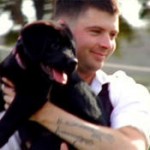
We’ve all seen how dogs and other pets can have healing powers. A pilot program in California pairs service dogs with returning veterans with brain injuries and emotional problems. Freedom Dogs is a non-profit agency in San Diego that trains service dogs to do anything from retrieving items to providing a comforting distraction from PTSD symptons. To read the full story, click here.
Mar
6
Healing Takes Courage
Filed Under Treating PTSD | Comments Off on Healing Takes Courage
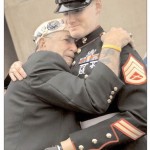 Its been almost two weeks since I last wrote a blog. We had to cancel Tony’s last EMDR session and reschedule for Monday, March 2nd. He is struggling trying to understand exactly what EMDR is supposed to do for him. He wants to analyze everything in concrete terms. That would be fine if PTSD were a concrete, cogntive issue. It is not. Trauma doesn’t first happen in the brain/mind. It happens in the sense cells of the body. These sense cells then rely the information to the brain for interpretation, and the brain determines if the stimulus from the cells is worthy of response ranging from being safe to a dangerous situation that would require the body to fight, flee, or just freeze from fear.
Its been almost two weeks since I last wrote a blog. We had to cancel Tony’s last EMDR session and reschedule for Monday, March 2nd. He is struggling trying to understand exactly what EMDR is supposed to do for him. He wants to analyze everything in concrete terms. That would be fine if PTSD were a concrete, cogntive issue. It is not. Trauma doesn’t first happen in the brain/mind. It happens in the sense cells of the body. These sense cells then rely the information to the brain for interpretation, and the brain determines if the stimulus from the cells is worthy of response ranging from being safe to a dangerous situation that would require the body to fight, flee, or just freeze from fear.
At the beginning of the session, Shelly, Tony’s therapist, takes him back to the first few days of being in Vietnam. When a military person is told where his/her assignment will be, there is no discussion. No bargaining saying, hey, I don’t want to go to that place because that is where most of the fighting and deaths occur. You can’t stand up and yell, “Hell no, I won’t go!” You are slowly being pushed into the decision that has been made for you by a stranger. You come to an acceptance of the situation – a realization that what is… is. Mission first. The job now is to stuff the feelings… fear, excitement, apprenhension. Shelly keeps gentle urging Tony to focus on the feelings. She is trying to getting his body to process the gaps between the mind and the body. I must say, that watching this session made me understand how much easier it is to stay in the head instead of the feeling in the body. The pain is real. Why would anyone want to go back to hell — except that only by going back will the body heal and the mind mend.
I am still being surprised at what I thought I knew but didn’t and what I never even considered as a potential problem. Yes, the whole experience of war gets dumped into the same memory box, wrapped up tightly and sealed away somewhere in the mind and body. Holy Smokes, healing combat trauma is like having to undergo an emotional chemo to survive. Just as chemo changes the cells of the body to fight against cancer cells, therapy to heal PTSD changes the cells in the mind/brain to recreate the sense cells of the body to heal from the damage of trauma.
Feb
26
Transitioning from combat to college
Filed Under Civilian life | Comments Off on Transitioning from combat to college
Returning combat vets who enter college can find the transition from combat to college to be difficult. Wenatchee Valley College in Washington offers an innovative way to allow veterans to gradually ease in to civilian life. Veterans have their own study house/lounge and are members of a group called STAVE (Student Transitional Assistance for Veterans’ Education.) STAVE was started by local veterans to help bring understanding about veteran students to faculty and other students. In addition to fundraising efforts to help needy families, the group arranges for counseling, financial assistance and tutoring for vets trying to get through school.
You can read the original story here.
Feb
23
PTSD: Community and Family Scars
Filed Under Treating PTSD | Comments Off on PTSD: Community and Family Scars
Last Thursday, Tony and I appeared on KGAB radio in Cheyenne, WY, followed by a book signing at a local book store. Our host, Dave Chaffin was a kind and thoughtful interviewer, much like Lorin and Dixie Ricker in Castle Rock. The broadcast was pretty typical for a book interview. That is, until listeners began calling into the station. We were talking about how a soldier’s neuro-network had been altered to react to combat threats and danger, and who when the individual returns home, his/her brain is still configured for combat and threat. For example, driving hazards are commonplace to everyday Americans. Road rage, stop & go traffic, debris alongside the roadway are all common occurrences. The combat veteran, however, can experience many of these things as a potential threat. A threat that can have a life and death consequence. An elderly lady phoned to tell of us of an experience she had while driving in downtown Cheyenne. She explained that while approaching a street light she had to stop quickly to avoid running the red light. The car behind her immediately whipped into the adjoining lane and the driver got out of his car, angrily walking toward her. She noticed he was wearing military fatigues. His face and demeanor were quite frightening to her, so she picked up her cell phone to call the police. Upon seeing this, the soldier turned and went back to his truck and left. The lady got his license plate and relayed the information to the police who contacted his commanders. What they discovered was this: The soldier had recently returned from Iraq and was having some severe adjustment problems. They asked the woman if she wanted to press charges, but she kindly declined. By no means does serving in combat excuse a person from inappropriate behavior, yet, it does show that combat PTSD can and will affect more than just the veteran and his/her family. It can impact the entire community in various ways, some that can be very negative. So the real message again is: “IF WE SEND THEM, THEN WE MUST MEND THEM”. For every one’s sake!
Another story: While at the book signing, we meet a young man in his early thirties. Initially, he wasn’t at all interested in purchasing our book, but he was intrigued by the title. When he sat down to chat, he began telling his story. He spoke of a stepfather who served in Vietnam and was incredibly cold, irritable, aggressive and cruel. Actually, he didn’t have a kind word to say. When we told him about the effects of combat and PTSD, he bought the book. His reason: Perhaps, he said, if he understood better what was going on with his step-dad, he might just be able to forgive him and lessen his own anger and hatred. The tragedy of this young man’s story is the fact it will be repeated over and over again unless, as a country, a community, and a family, we begin to build a greater awareness of how challenging trauma is to the well-being and health of everyone. PTSD is not a condition we can afford to disregard. The consequences will be too enormous and the costs, both economically and morally, too high!
Feb
20
PTSD and female soldiers
Filed Under Treating PTSD | Comments Off on PTSD and female soldiers
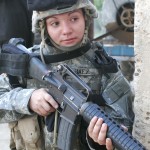
Psych Central has an article about the rising incidents of PTSD in female soldiers. Even though women are technically barred from combat, many are exposed to battle as they serve in support functions in combat areas.
Click here to read the article.
Feb
12
Link to Janet & Tony’s Radio Interview on Castle Rock Radio
Filed Under Events | Comments Off on Link to Janet & Tony’s Radio Interview on Castle Rock Radio
If you missed Janet and Tony’s interview today on Castle Rock Radio’s “Walking the Walk,” and “Getting Your Life Back,” click here to go to Castle Rock Radio’s website: http://castlerockradio.com/pages/page.asp?page_id=47571
Hosts: Lorin & Dixie Ricker
The download links are under the Media category on the left.
Feb
11
Castle Rock Radio “Walking A Walk”
Filed Under Events | Comments Off on Castle Rock Radio “Walking A Walk”
Thursday, February 12, 2009 @10:00 AM (MST)
“Walking A Walk”
Quote of the week: “We are now back on American soil, and again, we are reminded of how very much we love this country. Visiting Vietnam and Cambodia made it clear how very precious freedom is to a country, a people, and to us as individuals. To all those who have served America or are currently serving our great country abroad, thank you.” – Tony and Janet Seahorn, upon their return to the USA following their tour of SE Asia
This Week on “Walking A Walk” -This is it!… We’ve been letting you know about this special 2-hour edition of “Walking A Walk” for several weeks now, and it’s finally here! This week, our very special guests are Tony and Janet Seahorn, authors of the new book “Tears of a Warrior” (A Family’s Story of Combat and Living with PTSD). If you are a veteran who’s been struggling with PTSD or a TBI, or you know someone who is, please… tune in to this conversation with this remarkable couple! This is a cannot miss show!
Tony is a Vietnam vet (Dauntless Black Lions of the 1st Infantry Division) who has coped with his PTSD for more than three decades. Tony served in Nam from early 1968 until he was seriously wounded in December of that year. He was decorated for his service, earning two Bronze Stars, two Purple Hearts, an Air Medal for Valor in Flight, a Vietnamese Gallantry Cross, and a Presidential Unit Citation.
Janet is an educator, wife, mother and homemaker who has struggled for all those years beside Tony to try to help him cope with his PTSD. Indeed, in the early years, they didn’t even know what to call it… just that something was seriously wrong. Only in the past few years, a decade at most, has professional help and understanding of this disorder been forthcoming.
Their book is the chronicle of their path… “Our life’s journey for the past thirty-some years. We began writing our story several years back simply as a legacy for our two sons. But, with the Iraq war and soldiers returning from combat, we realized that there are many others who are now living our experience as well. Some certainly have more traumatic stories than ours. Combat PTSD is the silent bullet you never hear.”
In January, Tony and Janet took a significant and challenging tour of Southeast Asia, including a return to Vietnam – We’ll include their “trip report” in our conversation, and we’ll get their impressions and experiences in the land where Tony, along with so many brave American soldiers, friends and comrades, once fought a war.
This special broadcast just may hold some nuggets of hope for those vets and first responders who suffer from PTSD and TBI. Please, help us get the word out about this week’s show, and encourage anyone you know whom it might help to listen in – Your call-ins are welcome too!
Join us this Thursday at 10:00am MT, February 12th, with Janet and Tony on “Walking A Walk“! Please, invite your friends, family, combat vets and first responders to join us for this important conversation.
Brought to you by American Military Family, Inc. (http://AMF100.org), and funded in part by a generous grant from Intermountain Rural Electric Association (IREA). Castle Rock Radio, Community Programming with a World Wide Reach!


